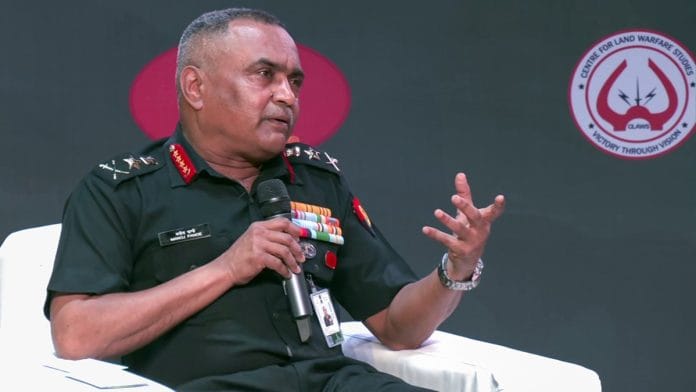New Delhi: One of the key lessons to emerge from the ongoing Russia-Ukraine conflict is that land will continue to remain a key domain of warfare, especially in “cases [like India] where you have disputed or contested borders”, Chief of Army Staff Gen. Manoj Pande has said.
The victory markers would have to be in the land domain and be defined in the land domain, he said, addressing a curtain-raiser for the Army’s inaugural Chanakya Defence Dialogue 2023.
To be held on 3 and 4 November, the Chanakya Defence Dialogue has been described by the Army as a forum “where experts, academia, intelligentsia and representatives from around the globe will ideate on global and regional security issues”.
General Pande said the forum would complement the Raisina Dialogue, India’s flagship conference on geopolitics and geostrategy, organised by the Ministry of External Affairs in collaboration with the think tank Observer Research Foundation (ORF).
Speaking at the curtain-raiser, General Pande said the land domain remains “extremely important” in India’s case.
Even so, he said, the Army continues to strive to enhance outcomes when it comes to integration with the other Air Force and the Navy.
Another key lesson of the Russia-Ukraine war, Gen. Pande added, “is the need to be self-reliant” in the realm of defence.
“One of the key lessons that we took from the Russia-Ukraine conflict is the need for us to reduce our dependency on the import requirements. I must say we have done really well in that area.”
In his address, General Pande discussed not just the lessons of the Russia-Ukraine war, but also India’s growing global profile as well as the Army’s reform efforts.
Also Read: I reviewed Army Chief Gen Manoj Pande’s performance 27 years ago. This is what I found
‘Unprecedented changes in geostrategic landscape’
The past year has been challenging as well as satisfying for the Army, Gen. Pande said as he discussed the progress made by the force.
“On the borders, the situation is stable and we have dealt with the internal security challenges in a manner that is expected of us,” he added, saying the Army had also made “good progress” on the ‘five pillars of transformation’ roadmap that it decided to embark upon last year.
The roadmap focuses on force restructuring, rightsizing, reorganisation, modernisation, and technology infusion.
The Army, he said, had laid down the deliverables needed to be achieved, as well as clear responsibilities. “It is progressing well,” he said.
Refining and improving the Army’s systems, processes, and functions to improve combat efficiency along with functional administrative efficiency was also part of the transformation process, he added.
Speaking about the human-resource management changes undertaken by the forces in the form of the Agnipath scheme, he said, “The first batch of Agniveers has joined the units and the feedback from the units is good and encouraging.”
In other comments, he said “India’s global and regional profile is on the rise”.
“India will continue to play a key role in the Indo-Pacific,” he added, saying that its enhanced stature had brought recognition as well as additional responsibilities and opportunities for India.
He said there are bound to be certain challenges that the country will have to encounter. “In all this, we will need to be proactive rather than [merely] respond or react, we should be able to shape our strategies looking at all this.”
Gen. Pande said there are unprecedented changes in the geostrategic landscape. “What we are also seeing is the centrality of national interest in this global flux. What we are seeing is, in the entire international system, national security’s salience is increasingly growing.”
Internally, he said, India is on the rise, “be it economic growth, technological progress, or the influence that the nation is building in the world arena”.
He also sought to underscore the importance of technologies, especially the disruptive and niche kinds.
As a country, India needs to see how it can leverage these technologies, given the changing character of war, he added, pointing to the new domains of warfare at play in the Russia-Ukraine conflict — cyber, space and information warfare, as well as the “battle of narratives”.
“All this just indicates the need to be better prepared and future-ready to be able to meet the security challenges from the Army’s point of view,” he said.
(Edited by Sunanda Ranjan)






